Participating Minot State University Faculty
The following Minot State STEM specialties are available to engage with your M-12 rural school STEM students! Click on each specialty to learn about which faculty are available to come to your classrooms!
Anatomy, Animal Behavior, Aquatic Ecology, Biology, Bats, Biomechanics, Chemistry, Childhood Physical Development, Conservation Biology, Dendrochronology, Dinosaurs, Drones, Ecology, Economic Minerals, Environmental Health, Environmental Science, Exercise Science and Rehabilitation, Exercise Physiology, Fish, Fossils, Genetics, Geology, Glacial Geology, Microbial Ecology, Medical Microbiology, Medicinal Plants, Molecular Biology, Motor Development, Neuroscience, Paleontology, Physical Education, Pollination, Remote Sensing, UAVs - UASs
Dr. Joe Collette - Professor of Geology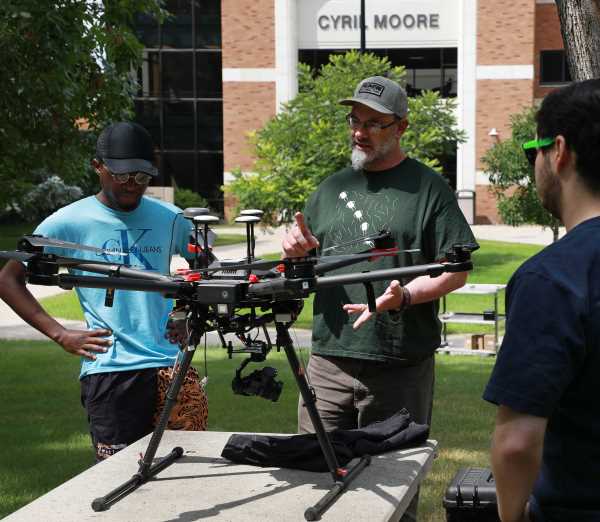
joseph.collette@ndus.edu
Cyril Moore Science Center office 119
Geosciences, Invertebrate Paleontology, Remote Sensing, and Drones (USA/UAV), Environmental Science
I am interested in a huge variety of topics including general geology, paleontology of some of the very first animals to crawl out of the water and onto land, and the sorts of things you can do with drones! Current research projects include: The health of the Lake Darling system, bioaccumulation of heavy metals in mosquitoes, algae, aquatic plants, and fish; modelling trace fossil behavior from long-dead animals, and using UAS/UAV (drones) to try and locate unmarked graves.
Dr. Yung-Ju ‘Ruth’ Chen – Assistant Professor of Kinesiology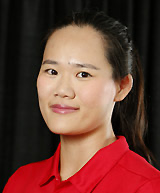 ruth.chen@minotstateu.edu
ruth.chen@minotstateu.edu
Swain Hall 108C
Motor Learning and Development, Childhood Physical Activity, Physical Education Teacher Education
My research is driven by a fundamental question: How can we, as professionals, better prepare children for a physically active life? To address this question, I primarily focus on three lines of research: (1) Understanding the naturalistic of children’s physical activity, (2) effective motor development and physical activity programs for children in daycare and elementary school settings, and (3) advancing evidence-based practices in physical education teacher education with technology. I enjoy collaborating with scholars from different disciplines, educators, and undergraduate and graduate students. My recent collaborations include: (1) The Impact of Mindful Physical Activity on Stress, Physical Activity, and On-Task Behavior, and (2) Exploring the Connections between Eye Movement and Motor Development in Young Children. My work has been presented at local, national, and international conferences and published in peer-reviewed journals.
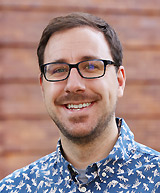 mark.lueders@ndus.edu
mark.lueders@ndus.eduDr. Beth Marschner – Assistant Professor of Kinesiology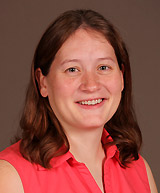 Physical Therapist and Athletic Trainer
Physical Therapist and Athletic Trainer
beth.marschner@ndus.edu
Swain Hall, 108D
Exercise Science and Rehabilitation – Anatomy, Exercise Physiology, Biomechanics, Pathomechanics
I have a wide variety of interests related to the human body and how it works. Clinical trials I’ve completed include vestibular rehabilitation post-concussion in athletes with dizziness and balance disturbances; instrument assisted soft tissue mobilization (IASTM) effects on 1) movement patterns including gait pattern and center of pressure 2) upper extremity grip strength 3) lower extremity power; and gait training and strengthening using an anti-gravity treadmill on individuals with lower extremity osteoarthritis. My current clinical research studies include 1) exploring the effect of autonomic nervous system regulation, visual-vestibular and balance training on reading ability 2) the relationship between young children’s motor skill development and eye movements 3) effect of underwater treadmill training, anti-gravity treadmill training and traditional treadmill training on cardiorespiratory fitness measures 4) effectiveness on IASTM in the treatment of plantar fasciitis 5) connections between tissue thickness, length and flexibility and the risk of injury using a portable diagnostic ultrasound.
Dr. Kata McCarville – Professor of Geosciences
Katherine.mccarville@ndus.edu
Cyril Moore Science Center – Office 117
Geology, Critical Minerals, Economic Geology, Environmental Science, and Soil Health/Native Vegetation Restoration
It is often said that “If it can’t be grown, it has to be mined,” and that’s true! I’m interested in science education for all ages in both formal and informal settings. I have developed a number of hands-on activities including cemetery geology, soil health assessments, North Dakota geology and fossils, rocks and minerals in everyday life, and more! I’m happy to work with teachers and youth group leaders to adapt or develop activities that will take advantage of your specific location and meet your needs. Current research directions include glacial and outburst flood geology, physical geography, fossil sea turtle nests, and the roles of organisms and disturbances in creating and maintaining healthy and productive soils. Another focus area for me is rocks and minerals—especially critical minerals that support an enjoyable standard of living and ensure national security—and the benefits and impacts of their extraction.
Dr. Abiodun Ebenezer Odufuwa – Assistant Professor of Biology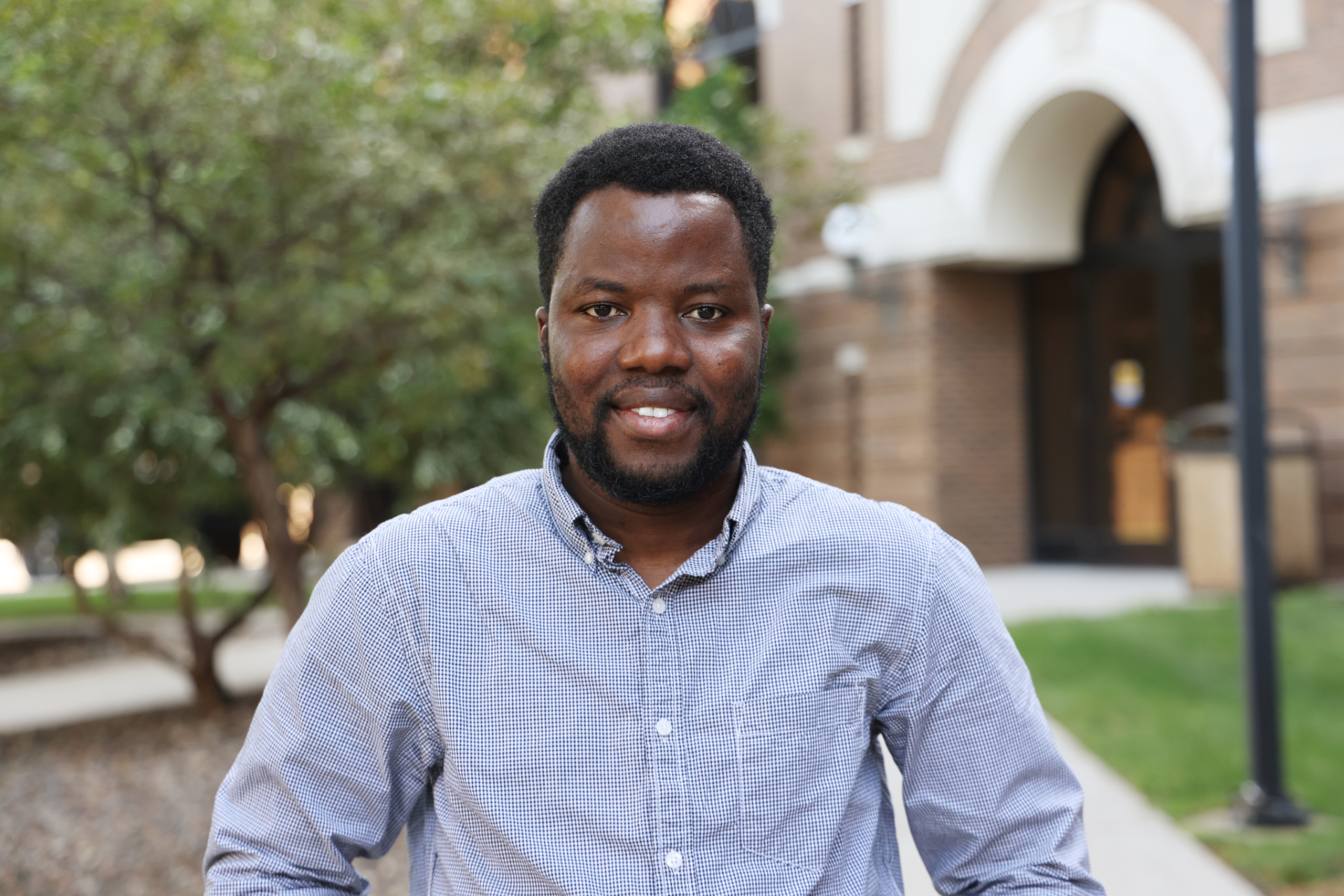 Abiodun.odufuwa@minotstateu.edu
Abiodun.odufuwa@minotstateu.edu
Cyril Moore Science Center office 229
Medical Microbiology, Medicinal Plants, Molecular Biology, Neuroscience
Research Interest: Imagine a world where a simple cut or sore throat could no longer be treated because the medicines (antibiotics) we rely on have stopped working. This is the reality we are moving toward as bacteria are becoming more resistant to antibiotics globally. My research is driven by the question: Why is this happening, and what can we do about it?
To tackle this challenge, I explore two exciting possibilities. First, we look at “green” nanoparticles—tiny, eco-friendly particles that could be designed to fight bacteria in new ways. Second, we study medicinal plants, which have been used for healing for centuries and may hold powerful natural compounds that modern medicine has yet to fully unlock. Together, these approaches bring both science and nature into the search for new
Dr. Joe Pettit - Assistant Professor of Biology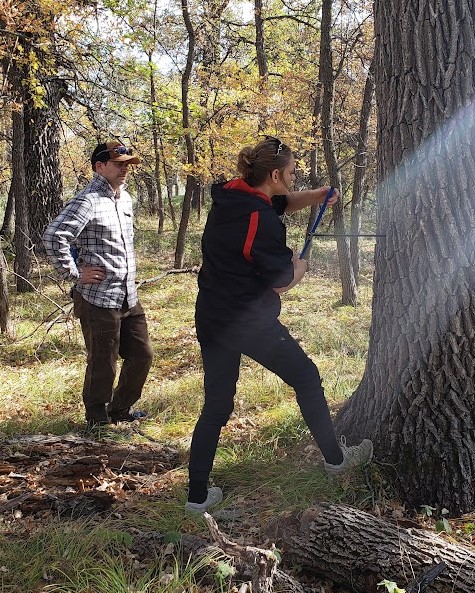
Joseph.pettit@minotstateu.edu
Cyril Moore Science Center office 219
Botany, Dendrology/Dendrochronology, Bats, Pollination
I am interested in all things related to ecology. I research pollination of flowering plants and how bats use forests. If species are interacting with the environment around themselves, I am all about it. Current research projects include: Locating and monitoring bat species in North Dakota, pollination ecology of toxic plants, finding caffeine in plants of North Dakota, pollen collection and identification, climate response analysis using tree rings.
Dr. Rachel Schomaker - Assistant Profession of Biology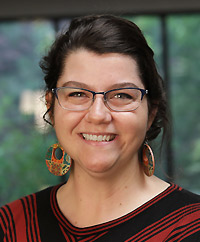 rachel.schomaker@ndus.edu
rachel.schomaker@ndus.edu
Cyril Moore Science Center office 217
Microbial Ecology, Environmental Health, and Genetics
I am interested in pretty much any work that involves tiny organisms and resource alteration. My current interests include: exploring the microbial diversity of toxin-producing plants and the insects that interact with them; investigating how diet affects the gut microbiome of domesticated cockroaches; and identifying the parasitic diversity of local ND reptiles and amphibians. I am pretty open to collaborating on and teaching about any microbial ecosystem, though, and really just love sampling and growing microbes. I also have experience identifying microalgae and determining how changing their light and carbon environment alters their biology at a molecular level. Techniques that we use in my lab include standard microbial growth techniques (aseptic use of agar and broth to grow organisms), using antibiotic discs to learn about antibiotic resistance, polymer chain reaction (PCR) to search for specific genes or identify organisms, and biochemical techniques for identifying microbes.
Ready to Get Started?
Take a look at how the 'Scientist in the Classroom', 'Research Experiences for High School Students', or 'Research Shadows' programs work, and then click one of the links below to give us what we need to get the ball rolling!
Scientist in the Classroom information form.
Research Shadows information form.
Research Experiences for High School Student information form (under construction).




